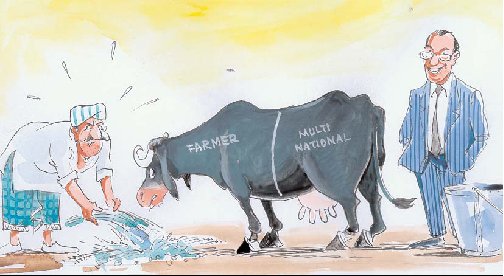|
CBD Alliance message to Rio+20

To all Governments participating in the Rio+20 UN Conference on Sustainable Development
The action taken over the next two decades will determine whether the relatively stable environmental conditions on which human civilisation has depended for the last 10,000 years will continue beyond this century. If we fail to use this opportunity, many ecosystems on the planet will move into new, unprecedented states in which the capacity to provide for the needs of present and future generations is highly uncertain.² (Global Biodiversity Outlook, 2010:13)
We write to you as the civil society network tracking the issue of biodiversity in Rio + 20 and in other fora, coordinated by the CBD alliance which works to ensure meaningful civil society participation at the negotiations of the Convention on Biological Diversity. We join many of you in agreeing that biodiversity is fundamental to our planet's future well being, and to humanity's future on the planet. It is at the heart of resilient ecosystems, which depends upon the rich diversity and interactions of all species. And it is essential for elimination of poverty, food sovereignty, marine diversity, water security, and health and spiritual wellbeing now and into the future. The food we eat and many of the medicines we consume, for example, depend on the richness of the biodiversity our ancestors, especially our Indigenous forefathers and mothers, have conserved and nourished over the millennia
As the last Global Biodiversity Outlook paper demonstrated however, biodiversity is now greatly endangered. We are losing soil, landscape, and marine-based biodiversity at breakneck speed. We have no time to waste. Long-standing threats are well known: fossil-fuel dependent industrial agricultural systems; unsustainable forestry practices, harmful subsidies, destructive fishing practices, urban sprawl, pollution and contamination of our atmosphere, waterways and landscapes; and invasive plant, animal, biotic, and marine species. Newer threats that concern us include: the development of biofuels that are produced in unsustainable ways and threaten the livelihoods of the most vulnerable; the unregulated development of new and emerging technologies such as geo-engineering and synthetic biology; a failure to respect and adhere to the precautionary principle, and last, but in no way least, the financialization of biodiversity, which implies the commodification of nature and life itsel
Biodiversity has deeply intrinsic meaning that also considers social, aesthetic, cultural, spiritual and existential practices and values. How can we place a price tag on that? Similarly, protection of biodiversity must recognize that the stewardship of non-human species and their habitats is essential to maintaining a livable planet. We are convinced that market mechanisms, like carbon trading and other such practices that essentially put a price tag to nature will backfire, accelerating the erosion of biodiversity. There is already mounting evidence of their detrimental impact through activities such as land speculation, land grabs' and corruption within payment for ecosystem services schemes. Market-based "green economy" approaches and the financialization of Nature ignore the third pillar of the International Convention on Biological Diversity: equity.
Techno-fixes are short-sighted and the benefits short-lived. They allow people to continue unbridled consumption, often at the expense of other species. They benefit the more powerful and rarely meet the needs and rights of the most marginalized, which on this weary planet are the peoples who are our greatest conservers of biological diversity - Indigenous Peoples, local communities, women, and small-holder farmers, fishers and pastoralists
In 1992, people came together for the first Rio Summit. Central to their participation was concern for what was happening to biodiversity. In 2012, at the Rio + 20 meeting of governments and peoples from around the world, the conservation and sustainable use of biodiversity, must once again be fundamental to discussions. Isolating biodiversity issues from water, forests, health, agriculture, and urban development issues, etc, would be counterproductive, undermining our global capacity to achieve lasting results. Rather than weakening biodiversity's importance, as seems to be the trend, we call on UNCSD to recognize biodiversity as an overarching and crosscutting issue in the Rio+20 negotiations; it should be closely integrated into all the relevant themes and agenda item
We urge all Governments to include biodiversity issues in all formal and informal deliberations. For our children today and for generations to come, we urge the United Nations, and Parties of the Rio Conventions to place biodiversity at the centre of any plan of action emerging from the deliberations at Rio+20 and within the proceedings of the Rio Conventions in the coming months and years.


|